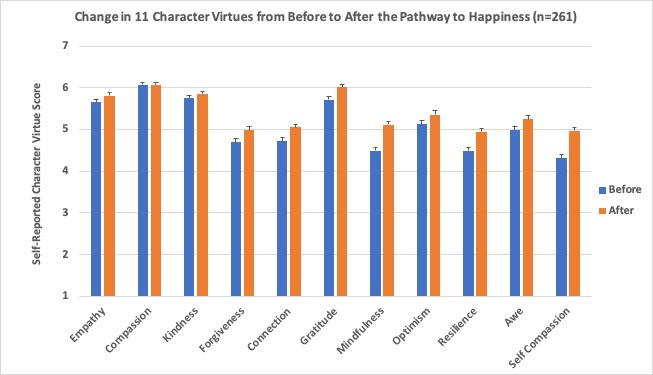A growing body of evidence shows that people can increase their happiness by engaging in positive activities like expressing gratitude, practicing mindfulness, and being kind and generous toward other people. Engaging in activities like these helps us shift our thoughts and behaviors in ways that can contribute to a more fulfilling life.
In recent years, scientists have posed some new questions about how these positive activities work. Specifically, which activities are most effective for increasing happiness, and is it the same for everyone? In other words, which “pathway to happiness” is the best for you, for me, and for anyone else?
These are the questions we at the Greater Good Science Center set out to explore by creating our Pathway to Happiness Program on the Greater Good in Action website. This four-week program is designed to both help you increase your happiness and help us understand which pathway to happiness is right for each person.
Each week, you’ll try one science-based practice while checking in with us to help you track your progress. At the end of four weeks, you’ll know which practices work best for you! That is the main point of the program: At the end of it, you’ll hopefully have a stronger idea of your own pathway to happiness.
Each of these practices target key skills that are shown to increase happiness:
- Gratitude. Gratitude involves an affirmation that there are good things in the world, and a recognition that the sources of this goodness are outside of ourselves.
- Mindfulness. Mindfulness means maintaining a moment-by-moment awareness of our thoughts, feelings, bodily sensations, and surrounding environment, through a gentle, nurturing lens.
- Empathy. Empathy is the ability to sense other people’s emotions, coupled with the ability to imagine what someone else might be thinking or feeling.
- Compassion. Compassion is the feeling that arises when you are confronted with another’s suffering and feel motivated to relieve that suffering.
- Kindness. Kindness is the quality or act of being generous, helpful, and caring about other people.
- Forgiveness. Forgiveness is a conscious, deliberate decision to release feelings of resentment or vengeance toward a person or group who has harmed you, regardless of whether they actually deserve your forgiveness.
- Connection. Social connection is the feeling that you belong to a group and generally feel close to other people.
- Optimism. Optimism involves a general expectation that good things are likely to happen in the future and bad things are unlikely to happen.
- Resilience. Resilience is the process of adapting well in the face of adversity, trauma, tragedy, threats, or significant sources of stress.
- Awe. Awe is the feeling we get in the presence of something vast that challenges our understanding of the world, like looking up at millions of stars in the night sky or marveling at the birth of a child.
- Self-compassion. Having compassion for yourself means that you treat yourself with kindness and understanding when confronted with your shortcomings—you see your mistakes as something you share with the rest of humanity, not as something to be ashamed of.
We’ve just kicked off the program, but our initial analyses suggest we’re off to a great start. So far, all participants have become more skillful in these practices, and they’ve ended up happier than they were before starting the Pathway to Happiness.

Now, it’s your turn to benefit. By participating, you not only have the chance to increase your own happiness, but you’ll also help us better understand which pathways to happiness work best. Sign up here to start your own Pathway to Happiness.









Comments